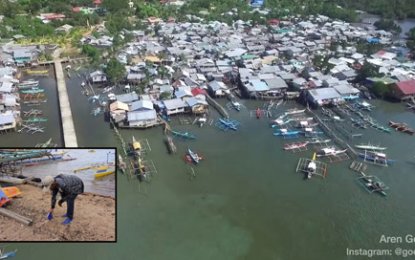
CORON CRACKDOWN. A member of Task Force Coron (inset) measures the easement zone in an area of Coron Bay, Coron town in northern Palawan, where the DENR has moved its crackdown against environmental law violators on Thursday (March14,2018). The photo also shows the houses and commercial establishments standing on stilts in the waters of the said bay. (Photo courtesy of DENR Mimaropa)
PUERTO PRINCESA CITY, Palawan -- The environment department’s clean-up drive against violators of the environment law is set to remove the houses of some 4,500 informal settler families in Coron, built either on the water or encroaching on easement zones and mangrove areas.
The Department of Environment and Natural Resources (DENR) intensified its crackdown on the tourist-frequented town last week to address water pollution and other environmental issues.
DENR Mimaropa Regional Director Natividad Bernardino, who is in Coron to supervise the drive, said Thursday an estimated 1,000 informal settler families have to be removed immediately as they have illegally occupied protected mangrove areas in Coron Bay.
“The environmental problem in Coron is a bit more complicated than El Nido. In El Nido, we only have to struggle against commercial establishments. In Coron, it’s both businesses and around 4,500 informal settler families, who were dislodged from their homes by super typhoon Yolanda,” she said.
Bernardino also said that their validation under “Task Force Coron” had already uncovered about eight big business establishments, whose structures were constructed in the waters of Coron Bay.
“We will name them after confirming details about their businesses. Right now, we’re still completing the result of the activity by the task force. Like El Nido, they will also be served notices of violations,” she stated, adding the notices will be served after the Holy Week.
Speaking before a crowd of 250 business owners and stakeholders gathered at the Coron Coliseum Thursday, Bernardino explained that the agency has to address high levels of coliform contamination in the bay.
She identified the absence of a centralized sewage treatment facility as the major problem that led to the deterioration of water quality in the bay, where establishments were found to be discharging wastewater aside from boats emitting used oil.
In an earlier press statement, she said there is a need to decongest Coron Bay and ensure compliance with environmental regulations in the municipality.
“We are appealing to the provincial government of Palawan and to the local government of Coron to provide resettlement for the informal settlers who were previously identified as beneficiaries of the typhoon Yolanda relocation program,” she said.
Task Force Coron, which was created by the DENR, was tasked to inspect more than 750 establishments for compliance with environmental regulations, and easement zone provisions of the Clean Water Act, Water Code of the Philippines, and the Forestry Code.
Bernardino admitted that rehabilitating Coron Bay may be more difficult due to the huge number of informal settlers, who have to be relocated before the DENR moves to demolish their structures.
Coron Mayor Ajerico Barracoso, meanwhile, said that the local government has already done a feasibility study for the construction of a PHP400-million sewage treatment plant project to prevent water pollution.
He said they are seeking the support of the Department of Tourism to help fund it to save Coron from the perils of a polluted bay because of wastewater discharge.
DOT Mimaropa Regional Director Maria Luisa Diploma, on the other hand, said their agency is closely monitoring tourist destinations, like Coron, and would be requiring all tourism-related businesses to have proper wastewater discharge facilities before they are accredited.
“If we will not protect our environment, tourists won’t be happy to visit anymore,” she said. (With reports from Ruth Rodriguez/PNA)
